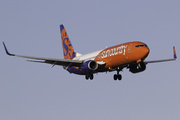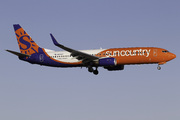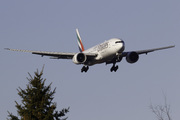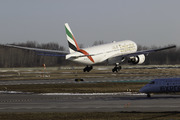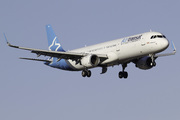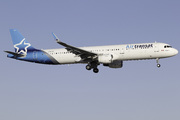Dépêches
Fitch: EU Airline Emissions Opinion Could Trigger Broader Dispute
Dépèche transmise le 5 octobre 2011 par Business Wire
CHICAGO--(BUSINESS WIRE)--A preliminary legal opinion to be handed down Thursday on the applicability of the European Union's (EU) carbon emissions trading scheme (ETS) could have broad implications for air travel market access worldwide and potentially trigger a broader global industry backlash.
Should the opinion, to be issued at the European Court of Justice, support the EU's proposed extension of greenhouse gas emission allowance rules to non-European airlines effective Jan. 1, 2012, Fitch sees the potential for the issue to escalate into a wider international trade dispute as airlines and governments grow more vocal over the regulation's economic impact.
Under the EU's aviation cap and trade plan, all airlines will be required to obtain permits covering carbon emissions from aircraft on routes either originating or terminating at EU airports. Emissions allowance purchase requirements will be determined by the volume of CO2 emitted by aircraft operated by both European and non-European carriers. The European Commission indicated in September that it will offer 85% of emissions allowances free in 2012, but global airlines nevertheless expect to face rising permit-related costs over the next decade.
The timing of the ETS's introduction into aviation next January is especially problematic for European and U.S. carriers already facing a more difficult 2012 operating outlook as a result of the global economic slowdown, high jet fuel prices and persistent overcapacity in high-fare trans-Atlantic markets.
Fitch agrees with the industry's assessment that ETS carbon permit costs will effectively serve as a tax on the world's airlines, raising operating costs on all European flights at a time when emissions charges are unlikely to be passed on to customers in the form of higher fares.
The U.S. industry, along with a number of foreign governments (notably China and India), has objected strenuously to the emissions plan as a violation of international law, in particular the terms of the 1944 Chicago Convention, which provides a framework for multilateral agreements on market access. Most non-EU governments continue to favor a multilateral agreement on emissions, negotiated under the auspices of the International Civil Aviation Organization (ICAO).
In its ECJ suit, the Air Transport Association's opposition to the ETS centers on the extraterritorial impact of the regulation. In particular, it opposes the requirement that foreign carriers obtain allocations for all emissions on flights to and from the EU, including segments of the route that are not in EU air space.
European airlines have emphasized the need to include foreign carriers in the emissions regime in order to ensure that a level playing field exists on international routes that either originate or terminate at EU airports. Estimates provided by the Association of European Airlines have projected emissions charges to be paid by European carriers at over 17 billion euros between now and the end of the decade.
If Thursday's non-binding opinion backs the legality of the plan, the European Court of Justice is expected to support an extension of the ETS to foreign carriers in its final ruling. In such a scenario, however, foreign governments and airlines will likely intensify their opposition to the scheme and pressure the EU to back away from its planned introduction next year.
U.S. airlines most vulnerable to margin pressure linked to a 2012 ETS roll-out include United Continental (UAL), Delta and AMR Corp.'s American Airlines, all of which derive 20% or more of global revenues from trans-Atlantic markets.
In the EU, the large global flag carriers British Airways, Lufthansa and Air France KLM all face increasing cost pressure tied to ETS allowance purchases. However, the European budget carriers such as Ryanair and Easyjet may suffer disproportionately due to their dependence on low-fare traffic and the expected difficulty they will face in passing on the emissions levies to fare-sensitive passengers.
Additional information is available on www.fitchratings.com.
ALL FITCH CREDIT RATINGS ARE SUBJECT TO CERTAIN LIMITATIONS AND DISCLAIMERS. PLEASE READ THESE LIMITATIONS AND DISCLAIMERS BY FOLLOWING THIS LINK: HTTP://FITCHRATINGS.COM/UNDERSTANDINGCREDITRATINGS. IN ADDITION, RATING DEFINITIONS AND THE TERMS OF USE OF SUCH RATINGS ARE AVAILABLE ON THE AGENCY'S PUBLIC WEBSITE 'WWW.FITCHRATINGS.COM'. PUBLISHED RATINGS, CRITERIA AND METHODOLOGIES ARE AVAILABLE FROM THIS SITE AT ALL TIMES. FITCH'S CODE OF CONDUCT, CONFIDENTIALITY, CONFLICTS OF INTEREST, AFFILIATE FIREWALL, COMPLIANCE AND OTHER RELEVANT POLICIES AND PROCEDURES ARE ALSO AVAILABLE FROM THE 'CODE OF CONDUCT' SECTION OF THIS SITE.
- 16:52 Friedrichshafen 2024 : Aura Aero présente pour la première fois
- 16:25 Friedrichshafen 2024 : Duc Hélices présente son hélice Tiger-3
- 15:33 Friedrichshafen 2024 : Splash-in Aviation expose son Pétrel X
- 07:25 Friedrichshafen 2024 : Robin "toujours présent et pour longtemps"
- 07:11 Friedrichshafen 2024 : Beringer présente au salon
- 07:01Friedrichshafen 2024 : la FFPLUM dément le passage de tous les ULM 3 axes à 600kg
- 06:44 Friedrichshafen 2024 : visite d'un Pilatus PC-12 (photos)
- 17/04 Friedrichshafen 2024 : Cirrus Aircraft présente son SR G7
- 17/04 Friedrichshafen 2024 : Piper présente son M700 Fury
- 17/04 Friedrichshafen 2024 : Junkers dévoile son A50 Heritage
- 17/04 Friedrichshafen 2024 : la société E-Props présente au salon
- 17/04 Le 30e salon de Friedrichshafen a ouvert ses portes
- 15/04 Airbus : commandes et livraisons de mars 2024
- 15/04 easyJet renforce ses dessertes depuis la France vers Budapest
- 15/04 Vueling inaugure sa liaison entre Orly et Heathrow
- 12/04 British Airways ouvre les candidatures pour son programme cadets Speedbird Pilot Academy
- 12/04 Icelandair et Expedia annoncent un nouveau partenariat
- 12/04 Turkish Airlines : résultats 2023
- 12/04 easyJet annonce deux nouvelles lignes depuis Lyon
- 12/04 Le premier Embraer E190 P2F fait son vol inaugural


